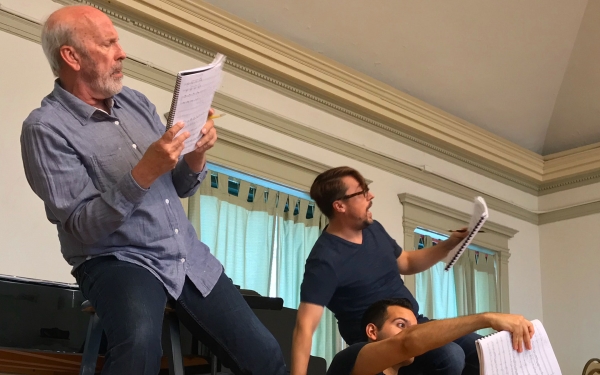
CHICAGO—(ENEWSPF)—September 14, 2018
By: Roosevelt University Media
Inspiration can be found in all places, and for CCPA faculty member and internationally-recognized composer, director and essayist Daron Hagen, it was discovered for his newest work in legendary filmmaker, actor, activist and visual artist Orson Welles. Hagen’s Orson Rehearsed, which will premiere at Chicago’s Studebaker Theatre, is described as a “70-minute multimedia Joycean stream of consciousness dreamscape.” It is a work that focuses on the last hour of Welles’s life, implementing an enormous variety of multimedia components and improvisational elements.
Visit the Orson Rehearsed website and a description of the event posits myriad ways the work could be, or not be, interpreted and performed. What is described as the “DNA” of the work — the different media selections, the compositions — lives on this website, but also is accompanied with a disclaimer that all, some or none of it would be used during a live performance. The website presents some challenging questions and is an extremely intriguing invitation of sorts to ponder what may be forthcoming. These live performances include an all-star creative team of artists and performers, such as Robert Orth, Robert Frankenberry, and Omar Mulero of Hagen’s New Mercury Collective.
Even during what no doubt is a very busy week of preparations for the premiere of this work, Hagen was able to answer some questions about his tenure at Roosevelt University, and how his time here has affected the trajectory of his career.
Q: Why did you ultimately decide to join as official faculty in 2017 at CCPA, and what opportunities has this provided for you in this part of your career?
A: I believe ardently in the American Dream and Roosevelt University’s commitment to social progressivism, which has figured centrally in my life as an artist citizen. My intense engagement with art’s ability to effect positive social change began during the late 1970s, when the theatrical works of Marc Blitzstein, Kurt Weill and Leonard Bernstein captured my imagination as an undergraduate at the University of Wisconsin-Madison. Serving on the artist faculty has enabled me to share my practical skills with numerous young composers, singers, musicians and actors, and to build collaborative relationships with the scholars and artists on the CCPA and Roosevelt faculties. At this point in my life, having written over a dozen operas, five symphonies, concertos, and a large and varied catalogue of other works, I consider the creation of music to be the way that I enter into life, but I also consider my young sons and wife to be the life that I enter into. Linda Berna, Henry Fogel and Rudy Marcozzi have enabled me to manifest those values in creating for me a situation where I can develop my musico-theatrical works under the Music Conservatory’s umbrella, folding into my web of professional collaborators from around the country conservatory students who thereby gain hands-on professional experiences that augment and enhance the formidable training that they are receiving as part of the overall curriculum.
Q: Overall, what inspires you as you work, teach and compose? What kind of process do you have?
A: All three activities are intertwined for me and are inspired by a passion for “connecting” emotionally with others, and inspiring others through storytelling to aspire to greater humanity. Process, I have learned for my own part, is pretty much the whole point: Performance is only one aspect of process, which also embraces social activism, study, meditation, practice, and learning to accept that the terms of an artist’s life are mainly those of defeat.
Q: How has your tenure at Roosevelt University affected your work and composition?
A: I taught for a decade during the ’80s and ’90s at Bard College immediately after graduating from The Curtis Institute of Music and The Juilliard School and, during that time, yearned to be “free” to pursue my art full time. Twenty-five years later, having done just that, I suspect that my appreciation for the crucial “institutional home base” role that a meaningful and inspiring faculty position at the right educational institution plays for a serious artist is pretty intensely enhanced. In other words, I understand that the artists create alone, and deal with their devils alone — but collaboration is when the angels fly in.
Orson Rehearsed premieres at the Studebaker Theatre in Chicago on Sept. 15 at 7:30 p.m. and Sept. 16 at 2:30 p.m. Tickets are free, but reservation is required.
Source: www.roosevelt.edu








